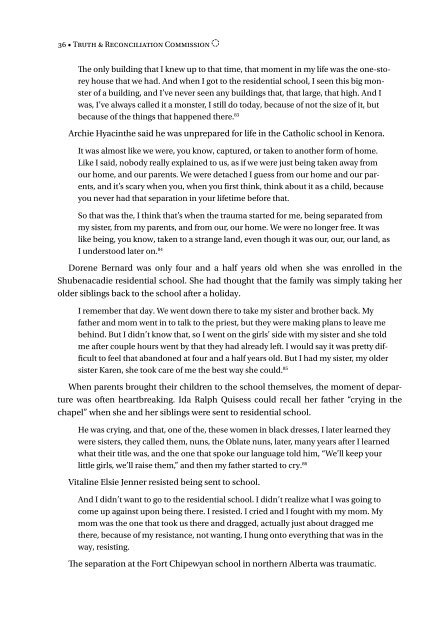The Survivors Speak
1MB8J05
1MB8J05
You also want an ePaper? Increase the reach of your titles
YUMPU automatically turns print PDFs into web optimized ePapers that Google loves.
36 • Truth & Reconciliation Commission<br />
<strong>The</strong> only building that I knew up to that time, that moment in my life was the one-storey<br />
house that we had. And when I got to the residential school, I seen this big monster<br />
of a building, and I’ve never seen any buildings that, that large, that high. And I<br />
was, I’ve always called it a monster, I still do today, because of not the size of it, but<br />
because of the things that happened there. 83<br />
Archie Hyacinthe said he was unprepared for life in the Catholic school in Kenora.<br />
It was almost like we were, you know, captured, or taken to another form of home.<br />
Like I said, nobody really explained to us, as if we were just being taken away from<br />
our home, and our parents. We were detached I guess from our home and our parents,<br />
and it’s scary when you, when you first think, think about it as a child, because<br />
you never had that separation in your lifetime before that.<br />
So that was the, I think that’s when the trauma started for me, being separated from<br />
my sister, from my parents, and from our, our home. We were no longer free. It was<br />
like being, you know, taken to a strange land, even though it was our, our, our land, as<br />
I understood later on. 84<br />
Dorene Bernard was only four and a half years old when she was enrolled in the<br />
Shubenacadie residential school. She had thought that the family was simply taking her<br />
older siblings back to the school after a holiday.<br />
I remember that day. We went down there to take my sister and brother back. My<br />
father and mom went in to talk to the priest, but they were making plans to leave me<br />
behind. But I didn’t know that, so I went on the girls’ side with my sister and she told<br />
me after couple hours went by that they had already left. I would say it was pretty difficult<br />
to feel that abandoned at four and a half years old. But I had my sister, my older<br />
sister Karen, she took care of me the best way she could. 85<br />
When parents brought their children to the school themselves, the moment of departure<br />
was often heartbreaking. Ida Ralph Quisess could recall her father “crying in the<br />
chapel” when she and her siblings were sent to residential school.<br />
He was crying, and that, one of the, these women in black dresses, I later learned they<br />
were sisters, they called them, nuns, the Oblate nuns, later, many years after I learned<br />
what their title was, and the one that spoke our language told him, “We’ll keep your<br />
little girls, we’ll raise them,” and then my father started to cry. 86<br />
Vitaline Elsie Jenner resisted being sent to school.<br />
And I didn’t want to go to the residential school. I didn’t realize what I was going to<br />
come up against upon being there. I resisted. I cried and I fought with my mom. My<br />
mom was the one that took us there and dragged, actually just about dragged me<br />
there, because of my resistance, not wanting, I hung onto everything that was in the<br />
way, resisting.<br />
<strong>The</strong> separation at the Fort Chipewyan school in northern Alberta was traumatic.


